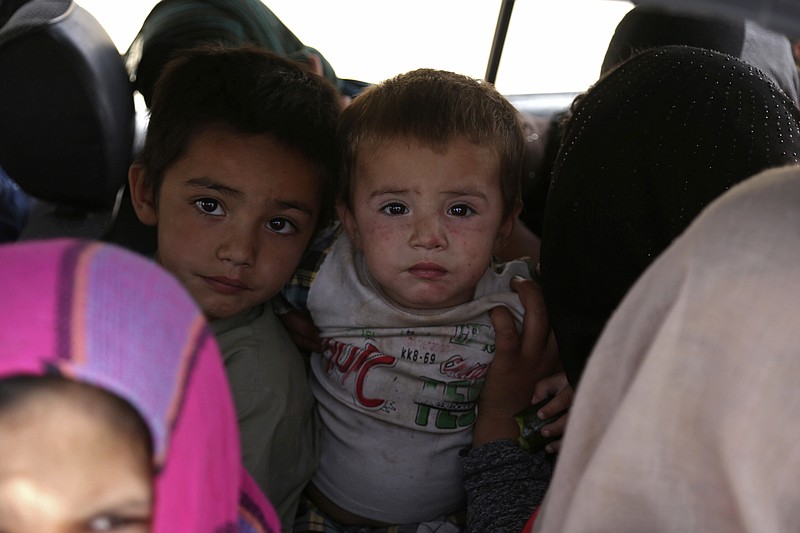KABUL, Afghanistan (AP) - Hundreds of people have fled four days of fierce fighting between Afghan forces and the Taliban over the key provincial capital of Ghazni that has killed about 120 security forces and civilians, the defense minister and witnesses said Monday.
Nearly 200 insurgents, many of them foreigners, have been killed, the government said.
Between the civilians have left the city and those too fearful to venture from their homes into the streets, "Ghazni has become a ghost town," said Ghulam Mustafa, who made it to neighboring Maidan Wardak province with 14 of his relatives.
"The city became so dangerous," the 60-year-old Mustafa told the Associated Press while stopped briefly at a checkpoint where police searched for wounded Taliban fighters.
The Taliban's multipronged assault, which began Friday, overwhelmed Ghazni's defenses and allowed insurgents to capture several parts of it in a major show of force. The Taliban pushed deep into the strategic city about 75 miles from the capital, Kabul.
The United States has carried out airstrikes and sent military advisers to aid Afghan forces in the city of 270,000 people. The fall of Ghazni, which is the capital of the province of the same name, would be an important victory for the Taliban, cutting Highway One, a key route linking Kabul to the southern provinces, the insurgents' traditional heartland.
A spokesman for the U.S. military, Lt. Col. Martin O'Donnell, said the city "remains under Afghan government control, and the isolated and disparate Taliban forces remaining in the city do not pose a threat to its collapse, as some have claimed."
He added that attempts by the insurgents to hide among the residents "does pose a threat to the civilian population, who were terrorized and harassed by this ineffective attack and the subsequent execution of innocents, destruction of homes and burning of a market."
Sporadic clashes are continuing, O'Donnell said.
Afghan authorities insist the city will not fall to the Taliban and that Afghan forces are in control of key government positions and other institutions.
"The Taliban have failed in reaching their goal," said Col. Fared Mashal, the provincial police chief.
Gen. Tareq Shah Bahrami, Afghanistan's defense minister, said about 100 Afghan police and army and 20 civilians have been killed in Ghazni, the first official casualty toll released by the government since the Taliban launched the massive assault.
At a news conference in Kabul, Bahrami said the casualty figures are not definite and that the numbers might change. Interior Minister Wais Ahmad Barmak said nearly 70 police were killed.
About 1,000 additional troops were sent to Ghazni, Bahrami said. He added 194 insurgents, including 12 Taliban leaders, were killed - with fighters from Pakistan, southern Russia's region of Chechnya and various Arab countries among the dead.
The Taliban destroyed a telecommunications tower on Ghazni's outskirts, cutting off landline and cellphone links to the city, where shops are closed. The fighting severely damaged Ghazni's historic neighborhoods and cultural treasures, Bahrami said, adding that he believes the next 24 hours would turn the tide in the battle.
Mustafa's wife, Razia, said they had no food, water or and electricity for four days.
"There were so many dead bodies under the bridges, at the side of roads and under the destroyed houses," she said.
Their son and two daughters were wounded by shrapnel from an airstrike on the Taliban near a mosque.
Another witness, Abdul Wasih, 59, said his son was wounded in the leg by a mortar attack Sunday that killed five of his close relatives.
"I went to the hospital, but it was full of dead bodies with a very bad smell," he said. Bodies wrapped in sheets lay in open wooden coffins in the hospital.
Wasih said that since his son's wound was not serious, he decided to take him to Kabul for treatment.
The U.N. expressed concern for the civilians caught up in the fighting.
Humanitarian officials report that the heavy fighting has resulted in more than 100 civilian casualties, U.N. deputy spokesman Farhan Haq said.
"Communications networks and electricity supply are currently down in the city, resulting in water shortages, and food is also reportedly running low," Haq said.
Rik Peeperkorn, acting U.N. humanitarian coordinator for Afghanistan, said residents "have seen their city turn into a battlefield since Friday morning, with fighting and clashes reportedly still ongoing."
In recent months, the Taliban have seized several districts across Afghanistan, staging near-daily attacks on security forces, but they have been unable to capture and hold urban areas.
Losing Ghazni to the Taliban would essentially cut Afghanistan in half, closing its second-busiest trade route. Although Kabul is also supplied from Pakistan, the trade route to Iran and the Gulf supplies the northern half or the country with many essentials.

